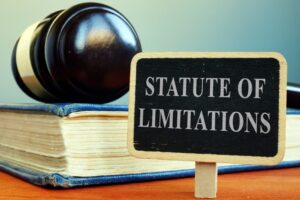An accident can scare, hurt, and overwhelm you. You may not know what to do next. When an accident happens, stay calm and reach out to a personal injury lawyer to protect your health and legal rights. This guide will walk you through what to do if you get hurt in an accident caused by someone else's negligence.
What to Do After Leaving the Scene
Once you have received any necessary emergency medical care, there are still several important next steps:Notify Your Insurance Company
Notify your auto insurance company that you were in an accident, even if you were not at fault. Provide them with factual details, like:- Date
- Time
- Location
- Description of the accident circumstances
- The other driver's name, contact info, license plate, and insurance details
- Names and contact info for any witnesses
- Police report number if law enforcement responded to the scene
Seek Further Medical Treatment
 If your injuries were serious, follow up with additional medical care. See your regular doctor or visit an urgent care clinic or hospital as needed. Inform your medical providers that your injuries stemmed from an accident so this fact gets documented in your medical records.
While police and EMTs may treat immediate injuries at the accident scene, you'll likely need follow-up care in the days and weeks afterward. Don't delay in seeing additional medical providers.
If an ambulance transported you from the accident site, follow the discharge instructions once released from the hospital. Schedule a visit with your primary care physician right away so they can evaluate your condition.
For injuries that seem minor, you may choose to go to an urgent care clinic, walk-in clinic, or emergency room for examination and treatment. Wherever you receive care, provide details that your injuries resulted from a recent auto accident or other incident.
Having this fact documented thoroughly in your medical records creates an official link between your health issues and the accident that caused them. This documentation will become evidence if you later file an injury claim or lawsuit.
Your medical providers will also guide you on the treatment plan going forward. Follow all instructions for medication, physical therapy, specialist referrals, work restrictions, and other care precisely as directed. Failing to follow your treatment plan could undermine your eventual injury case.
If your injuries were serious, follow up with additional medical care. See your regular doctor or visit an urgent care clinic or hospital as needed. Inform your medical providers that your injuries stemmed from an accident so this fact gets documented in your medical records.
While police and EMTs may treat immediate injuries at the accident scene, you'll likely need follow-up care in the days and weeks afterward. Don't delay in seeing additional medical providers.
If an ambulance transported you from the accident site, follow the discharge instructions once released from the hospital. Schedule a visit with your primary care physician right away so they can evaluate your condition.
For injuries that seem minor, you may choose to go to an urgent care clinic, walk-in clinic, or emergency room for examination and treatment. Wherever you receive care, provide details that your injuries resulted from a recent auto accident or other incident.
Having this fact documented thoroughly in your medical records creates an official link between your health issues and the accident that caused them. This documentation will become evidence if you later file an injury claim or lawsuit.
Your medical providers will also guide you on the treatment plan going forward. Follow all instructions for medication, physical therapy, specialist referrals, work restrictions, and other care precisely as directed. Failing to follow your treatment plan could undermine your eventual injury case.
Collect Documentation
Gather copies of your medical records, medical bills, repair estimates for vehicle damage, and any other documentation related to costs and losses from the accident. You'll need this paperwork if you file an insurance claim or lawsuit. Preserving evidence is one of the most important things to do after an accident. If you're seeking compensation from an insurance claim or personal injury lawsuit, you'll need compelling documentation and records to prove the full extent of your damages. Collect copies of:- All medical records, treatment notes, test results, physician comments, etc., related to your accident injuries. Request these from each provider.
- Itemized bills and invoices you receive for all medical treatment, ambulance transportation, medications, medical equipment, therapy, and other injury-related costs.
- Auto repair estimates and bills for any vehicle damage sustained in the accident. Keep the receipts even for minor repairs.
- Proof of any other damages related to the accident, such as towing fees, rental car costs, damaged personal belongings, etc.
- Employment records and payment stubs showing income you lost by missing work during your recovery.
Handle Insurance Communication Carefully
You'll likely get calls from an insurance adjuster regarding the accident, especially if the other driver was clearly at fault. Be cautious about providing statements to the other party's insurance company. Refer them to your own insurance company or attorney. They will use anything you say to minimize the amount they pay out. If the other driver involved in the accident was at fault, you can expect their insurance company to contact you after the incident. They'll want to get your version of events in a recorded statement. However, do not speak to or provide any information to the other party's insurance representatives. Their interests do not align with yours. Their goal is to pay out as little as possible on the claim or avoid any payment at all if they can cast doubt on liability. Any statements you provide could be taken out of context or used to imply your own negligence contributed to causing the accident. This could minimize the compensation value of your injury claim against their insured driver. A good rule of thumb is to politely refuse to give any statements and refer the adjuster to your auto insurance company or personal injury lawyer. You are under no obligation to cooperate with the other insurer's investigation. If you haven't yet secured legal representation, state you've been advised not to provide any information while the facts are still being reviewed. Don't get bullied into giving a statement just because the adjuster insists on it. Once you have an attorney, they will handle all communication and correspondence going forward. Follow your lawyer's guidance on if and when to give your official recorded statement.What Are Your Legal Options After an Accident?
In many accident cases, you may have grounds to file a personal injury claim or lawsuit against the at-fault party to recover compensation for your damages. These could include:Medical Expenses
One of the primary reasons to file a personal injury claim after an accident is to recover compensation for all medical expenses related to your injuries. This includes current and future costs for treatments, procedures, hospital stays, doctor visits, medications, medical equipment, therapies, and any other healthcare needs. Even with health insurance, accident victims often get stuck paying out-of-pocket costs like deductibles and copays. This doesn’t include future expenses like surgeries, rehabilitation, home healthcare, medical devices, and long-term care arising from permanent disabilities or chronic conditions stemming from the accident injuries. When seeking compensation, include costs for:- Emergency medical transportation (ambulance, life flight, etc.)
- Emergency room visits
- Hospital stays and treatment
- Physician appointments and consultations
- Diagnostic testing (X-rays, MRI, CT scans, labs, etc.)
- Physical and occupational therapy
- Mental health counseling for accident trauma
- Prescription medication
- Medical equipment (wheelchair, walker, home healthcare bed, etc.)
- Home renovations to accommodate disabilities (wheelchair ramps, grab bars, etc.)
- Future estimated medical treatment and care needed
Lost Wages From Missed Work
In addition to medical expense compensation, personal injury claims allow recovery of lost income if your injuries caused you to miss work during your recovery. If you suffered disabling injuries, you may recover future lost earning capacity damages. When seeking compensation for lost wages, you'll need proof of income and employment records showing:- How many days/weeks/months of work you missed due to your injuries
- Your typical earnings and payment history (W-2, pay stubs, income tax returns, etc.)
- Whether you used paid time off, sick days, short/long-term disability, etc.
- If you lost job opportunities, promotions, or other earnings advancement due to your injuries
- Your occupation, job duties, and employment history relevant to future earnings losses
Property Damage to Your Vehicle
If you were involved in a motor vehicle accident, another category of damages to claim is repair costs for any property damage sustained to your vehicle in the collision. This includes:- Cost of repairing your vehicle at an auto body shop
- Rental car expenses while your vehicle was being repaired
- "Loss of use" damages for the time you couldn't use your vehicle
- Diminished value of your vehicle after repairs, reducing its worth
- Full replacement value if your vehicle was totaled in the accident
Pain and Suffering
Unlike tangible economic damages like medical bills and lost wages, pain and suffering refers to compensation for the physical and emotional distress caused by your accident injuries. It covers categories like:- Physical pain from injuries and medical treatments
- Emotional and mental anguish (anxiety, PTSD, depression, etc.)
- Loss of enjoyment or quality of life
- Disability, disfigurement, or permanent impairments
- Loss of consortium (impact on marital relationships)
- The severity and permanence of your injuries
- Degree of physical limitations and disabilities
- Impact on your daily activities and quality of life
- Duration and potential longevity of your pain, suffering, and emotional distress
- Your age, occupation, and previous lifestyle before being injured
- Effect of drug regimens, future medical treatments, and therapies
Remember the Statute of Limitations
 Every state has set deadlines called statutes of limitations. The statute of limitations determines how long you have to file a personal injury lawsuit after an accident. Once that window closes, you lose your legal right to pursue a case over the incident.
The time limit varies by state but is typically between one and three years. Some states have different statutes of limitations for different cases, like vehicle accidents versus medical malpractice.
Failing to initiate legal action within this time frame means you can no longer seek compensation through the court system. This is why it's best to not delay in exploring your legal options after an injury.
Every state has set deadlines called statutes of limitations. The statute of limitations determines how long you have to file a personal injury lawsuit after an accident. Once that window closes, you lose your legal right to pursue a case over the incident.
The time limit varies by state but is typically between one and three years. Some states have different statutes of limitations for different cases, like vehicle accidents versus medical malpractice.
Failing to initiate legal action within this time frame means you can no longer seek compensation through the court system. This is why it's best to not delay in exploring your legal options after an injury.
Most Injury Lawyers Work on Contingency Fee Arrangements
When you hire a personal injury lawyer, they will typically work on a contingency fee basis. This means their legal fees are contingent upon winning compensation in your case. If they don't secure a settlement or court award, you owe them nothing for their services. Contingency fees provide access to legal representation for injury victims who can't afford to pay an upfront retainer fee. The contingency fee is a percentage of any compensation recovered.Protect Your Rights With a Personal Injury Lawyer

